by Gerrit Bester
At a time when higher education is central to addressing societal challenges and driving economic growth, the relationship between the Council on Higher Education (CHE) and South African universities has never been more important. Two workshops held at the Tshwane University of Technology (TUT) on 6 August underscored this importance, bringing together key stakeholders to discuss collaborative strategies aimed at improving the efficiency, effectiveness and rigour of internal quality assurance systems.
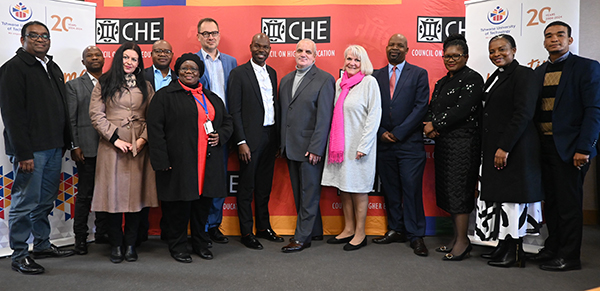
Dr Whitfield Green (CHE Chief Executive Officer) and Dr Britta Zawada (CHE
QAF Implementation Coordinator) photographed with EMC members.
A three-member delegation from the Council on Higher Education (CHE) visited the University to conduct workshops with members of the Executive Management Committee, Senate and Institutional Management Committee. The title of the workshop, facilitated by the Office of Institutional Effectiveness & Technology and the Directorate: Quality Promotion (DQP), was Preparing your institution for the Quality Assurance Framework (QAF).
The CHE delegation included Dr Whitfield Green (Chief Executive Officer), Dr Britta Zawada (QAF Implementation Coordinator) and Mr Collins Baloyi (Project Administrator), with Dr Green and Dr Zawada presenting the workshops.
Strengthening partnerships in higher education
According to Ziyanda Ngxabazi, Acting Director of the DQP, the purpose of the workshops was for the CHE to unpack the nature and purpose of the QAF, especially amendments brough in by the QAF. "In addition, the workshops were intended for the CHE to clarify the key roles to be played by both EMC and Senate in the implementation of the QAF. The workshops also provided an update on the progress made by the CHE in preparing for the implementation of the QAF," said Ngxabazi.
She added that the workshops gave her and others a better understanding of the QAF implementation plan and how TUT should look at its processes holistically. "The workshops highlighted the importance of a functional Internal Quality Assurance (IQA) system, which will result in a highly functional outcome for the University. It is no longer business as usual, the QAF introduces changes that will affect the way we manage our IQA," she added.
"The CHE workshops have emphasised not only the relationship between TUT and them, but also the relationships within the CHE itself, so that work is not done in silos. I am happy with the way the CHE is changing the way it interacts with institutions. Now we are moving towards a more collegial type of relationship and away from a bureaucratic one. The relationship has started, the workshops are proof of that good relationship."
Role of the Directorate: Quality Promotion
The DQP is responsible for ensuring excellent practice within the University by performing a quality promotion and quality assurance function. The assurance function is carried out through programme accreditation, approval and registration of qualifications, reviews, audits, surveys, the Office of the Student Ombudsman, the development and maintenance of an institutional Quality Management System, and quality promotion and capacity development. The Directorate is also responsible for ensuring that the University is prepared for the implementation of the QAF and that everyone is aware of the QAF and their roles in relation to its implementation.
Insights from the workshops
Attendees of the workshops responded positively to the CHE engagement:
Dr Caroline Selepe: Senior Director, Strategic Support, Office of the Vice-Chancellor:
“The QAF is a good mechanism for TUT to embed quality management in all that we do to advance the academic project. In addition, it’s a tool we can use to measure and demonstrate the success of our journey as we transform ‘from good to great.’
If TUT could be able to practice and live the seven principles of the QAF, the institution will be able to produce great graduates which industry and society at large will compete to grab as employees and entrepreneurs, thus really making TUT A People’s University.
The QAF enforces continuous engagement between the CHE and the HE&T sector as mutual stakeholders with various responsibilities to bring positive change within the institution(s) through the transformation of the academic project, mainly as a driver of overall cultural change within the institution.”
- Established by the Higher Education Act of 1997, the CHE plays a vital role in advising the Minister of Higher Education and Training on critical matters affecting the sector, while also overseeing an external quality assurance system through its Higher Education Quality Committee (HEQC).

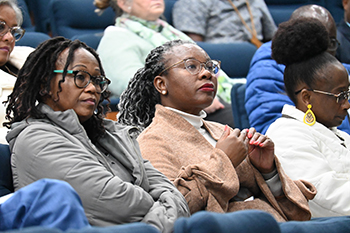
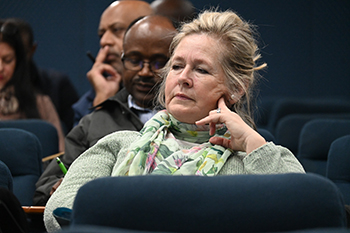
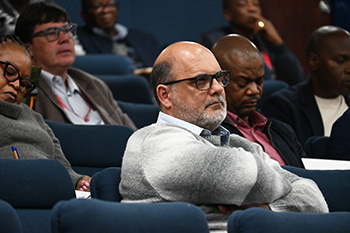
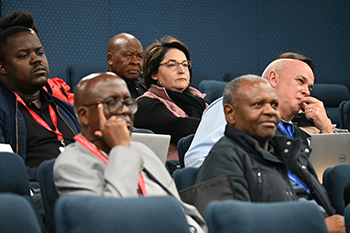

Senate and Institutional Management Committee members attending one of the workshops, which highlighted the need for strong partnerships between the CHE and universities to foster an educational landscape that meets the evolving needs of South African society.
